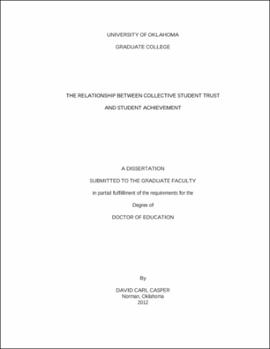| dc.description.abstract | The relationship between collective student trust and student achievement was tested in a sample of 1,748 5th grade students in 34 Title I elementary schools in an urban and urban fringe district. Trust was defined, the conditions of trust described, and the facets of trust discussed. Collective trust was distinguished from relational trust and evidence on the effects of other trust was reviewed. Multi-level modeling was utilized to analyze nested data. Results indicate that collective student trust was associated with higher mathematics and reading achievement in schools. When controlling for SES, school size, and school identification, collective student trust had the largest unique effect on mathematics and reading achievement. Collective student trust was the only significant school level factor for achievement differences. A post hoc analysis indicated that high poverty schools with high collective student trust had higher achievement than high poverty schools with low trust. Results are discussed through the lens of self-determination theory. | |
